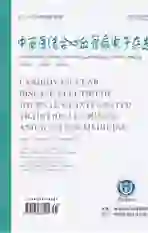综合护理在脑梗死后不同程度吞咽困难患者中对饮水恢复时间的影响
2020-12-16张倩倩
张倩倩
【摘要】目的 分析综合护理在脑梗死后不同程度吞咽困难患者中对饮水恢复时间的影响。方法 选取2018年3月~2020年1月我院收治的脑梗死后吞咽障碍患者64例;分组:随机分为研究组与对照组,各32例。对照组基础护理,研究组综合护理。比较两种干预措施吞咽改善情况与饮水恢复时间。结果 研究组总有效率高于对照组,差异有统计学意义(P<0.05)。研究组饮水恢复时间、进食时间早于对照组,差异有统计学意义(P<0.05)。结论 综合护理能够缓解脑梗死患者吞咽困难症状,尽快进食饮水补充机体营养需求,提高护理效果。
【关键词】综合护理;脑梗死;吞咽困难;饮水恢复时间
【中图分类号】R473 【文献标识码】A 【文章编号】ISSN.2095.6681.2020.31..02
Effect of Comprehensive Nursing on Recovery Time of Drinking
Water in Patients with Difficulty Swallowing after Cerebral Infarction
ZHANG Qian-qian
(Department of Neurology, people's Hospital of Siyang County,Jiangsu Province Suqian 223700,China)
【Abstract】Objective To analyze the effect of comprehensive nursing on recovery time of drinking water in patients with varying degrees of dysphagia after cerebral infarction.Methods Research period:March 2018-January 2020;research object:64 patients with dysphagia after cerebral infarction admitted in our hospital; grouping: randomly divided into research group and control group, 32 cases in each group. Basic nursing in the control group and comprehensive nursing in the research group. Compare the improvement of swallowing with the two interventions and the recovery time of drinking water.Results The total effective rate of the study group was higher than that of the control group (P<0.05).The water recovery time and eating time of the study group were earlier than those of the control group (P<0.05).Conclusion Comprehensive nursing can relieve the symptoms of dysphagia in patients with cerebral infarction, eat and drink as soon as possible to supplement the body's nutritional needs, and improve the nursing effect.
【Keywords】Comprehensive care;Cerebral infarction;Dysphagia;Drinking water recovery time
腦梗死会引起机体功能不稳定,患者治疗后留下不同程度的后遗症,例如:语言交流障碍、吞咽障碍、肢体活动受限等。其中,常见的是吞咽障碍,给患者生活带来严重影响,无法顺利进食就会出现焦虑、烦躁情绪,影响康复效果。为提高康复效果,我院提出综合护理措施从而改善患者吞咽障碍,恢复正常进食,保证机体营养需求,提高康复效果。
1 资料与方法
1.1 一般资料
选取2018年3月~2020年1月我院收治的脑梗死后吞咽障碍患者64例;分组:随机分为研究组与对照组,各32例。
对照组:男(n=13),女(n=19),年龄45~85岁,平均:62.1±3.5岁。其中,3级10例、4级10例、5级12例。
研究组:男(n=16),女(n=16),年龄46~84岁,平均:60.4±3.6岁。其中,3级9例、4级12例、5级11例。64例患者临床资料对比无差异,差异无统计学意义(P>0.05)。
1.2 方法
对照组:常规护理:健康指导、用药管理、活动指导、环境护理。
研究组:基于常规护理下综合护理:(1)吞咽训练。让患者伸出舌头,左右运动摆向口角,舌尖舔下唇、舔上唇。如果患者活动困难,护理人员可以利用压舌板按摩舌头。刺激与空吞咽:冰棉棒蘸取少量水刺激软腭、舌根、咽喉壁,患者做吞咽指令。(2)进食训练。患者保持半卧位,首先从4 mL开始逐步增加15 mL,指导患者咀嚼、吞咽并记录所用时间。由流质转为半流质、正常饮食。引导识记摄食、咀嚼、吞咽等动作,重建运动传导通路。(3)护理人员主动与患者交流,改善不良情绪,鼓励主诉,促进交流表达能力。第四,饮食方面以清淡为主,多食水果,预防便秘。
